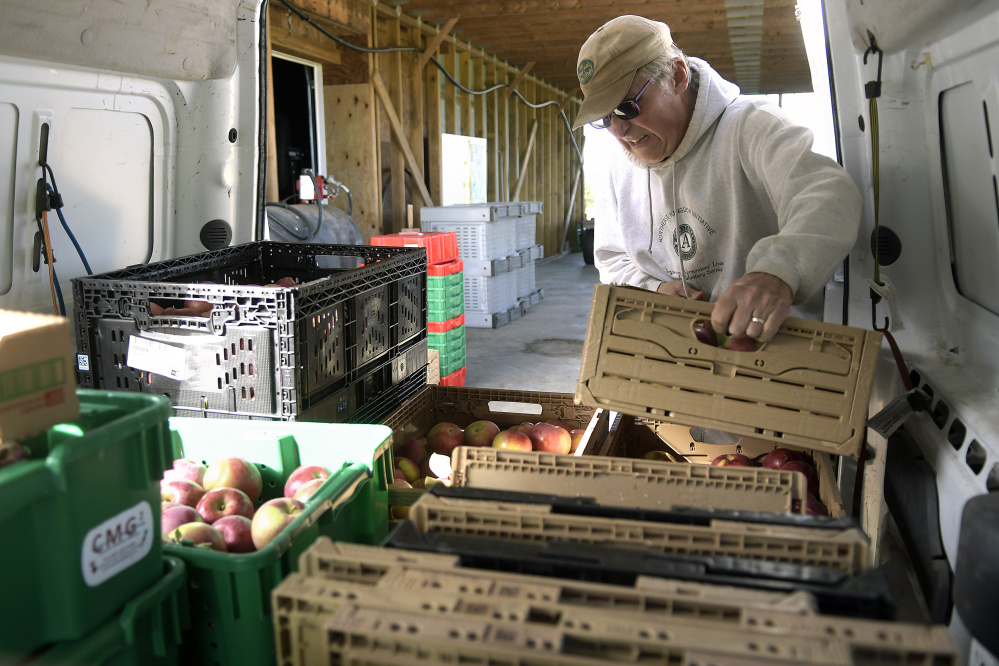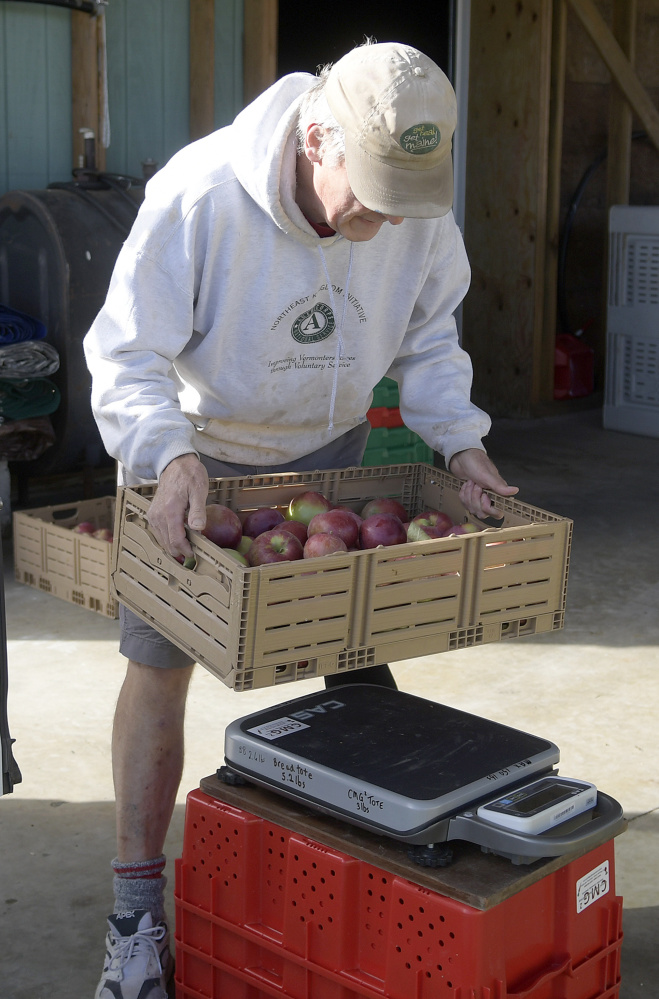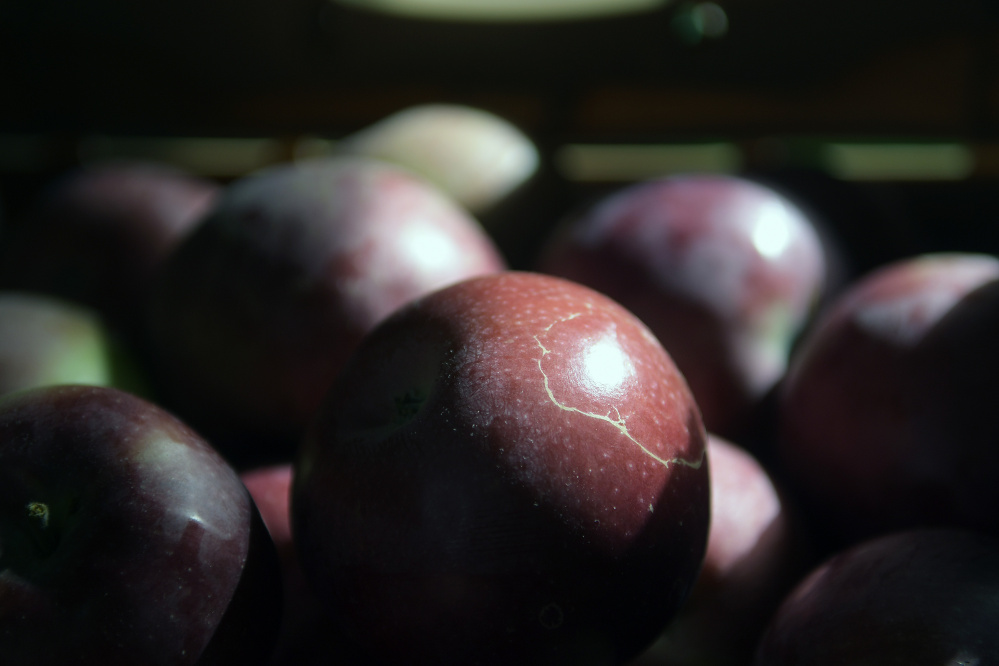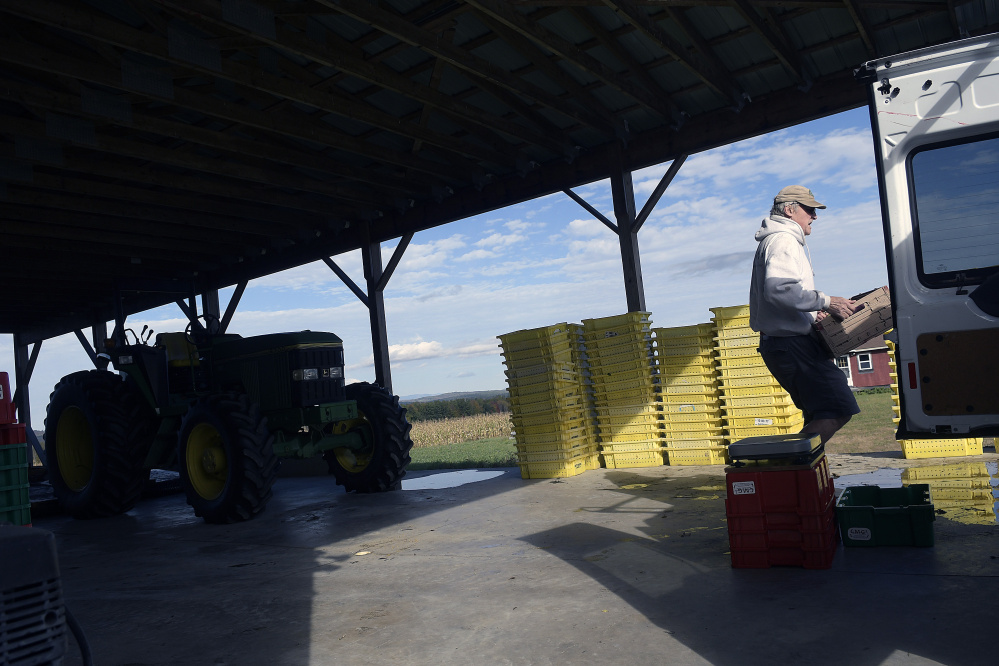READFIELD — Stephen Knight picked up almost 600 pounds of Macintosh apples from the Kents Hill Orchard Wednesday morning, and on Friday, he’ll be back for more.
After teaching chemistry at Winthrop High School for more than 20 years, he discovered a passion for gleaning food and helping others.
“There’s enough of a human need for this food, so I’ve done more this week than usual,” Knight said while loading apples into his van Wednesday morning.
Gleaning is the act of collecting excess fresh foods from gardens, farms and markets to provide it to people in need. The United States Department of Agriculture estimates that more than 100 billion pounds of food is thrown away each year.
After packing up about a dozen crates with 587 pounds of apples, Knight was planning to take some to a walk-in cooler on a farm in Winthrop, with the rest being delivered to the St. Mary’s Nutrition Center in Lewiston, which serves about 600 families a week.

Steve Knight, of Winthrop, weighs apples he collected Wednesday in Readfield to glean. The retired teacher has collected several thousand pounds of vegetables and fruit that were cast off by farmers to distribute them to local food kitchens and food banks.
“Last week, I brought them 400 pounds of apples and they were scooped and gone (immediately),” he said.
Hannah Semler, of the Maine Gleaning Network, said Knight has given the network a “wonderful platform” in central Maine to ensure food rescue for food pantries and meal sites.
“Steve Knight has been a wonderful gleaning force in central Maine, and he has created a collaborative gleaning model with Healthy Waterville and Healthy Communities of the Capital Area,” Semler said by email.
Maine Gleaning Week lasts until Oct. 16 and Semler said the network has already gleaned more than 5,000 pounds of food from a variety of farms.
“We are celebrating the bounty of our local farms and the generosity of our community, while bringing awareness of the realities of food security from a social (hunger relief) and environmental (climate change) perspective,” she said.
In addition to the nutrition center in Lewiston, Knight, who runs the Central Maine Gleaning Group, delivers fruit and produce — apples, green beans, summer squash, cabbage, tomatoes and more — to local organizations like the Augusta Food Bank, the Capital Area New Mainers Project and the LINC Wellness and Recovery Center.
Susan Williams, the food bank’s manager, said the fresh produce and fruit Knight delivers is used to supplement the food the organization prepares for the 100 or so families it serves each week.

Steve Knight, of Winthrop, calculates apples gleaned Wednesday from an orchard in Readfield. The retired teacher has collected several thousand pounds of vegetables and fruit that were cast off by farmers to distribute them to local food kitchens and food banks.
“Because it’s so fresh and was just picked, it has a much longer shelf life than something that gets donated from a grocery store,” Williams said.
Many of the customers who come to the food bank are immigrants, Williams said, and they tend to be the ones who choose more of the fresh fruit. She said about 33 percent of the customers don’t choose much fresh food, and she said it has a lot to do with education.
“They (see a summer squash) and don’t know what to do with it,” she said. “We have some people who come in occasionally and they’ll make a recipe people can sample.”
Having fresh and locally grown fruits and vegetables is important because not only is it typically healthier than the food customers usually choose, it gives the food bank a chance to educate people on its benefits.
Chris Myers Asch of the Capital Area New Mainers Project agrees and said receiving fresh food from Knight and other groups has been “wonderful.” He said it’s a great program and a Maine tradition to make the most of what the land gives.
Myers Asch said the new Mainers group provides food for about three dozen immigrant and refugee families, and they are accustomed to having fresh produce and using it on a regular basis.
“Having fresh crops is part of their tradition and they certainly know what to do with them,” Myers Asch said. “You can smell it when they’re cooking, and it reminds them of home. Being able to cook traditional food certainly helps with their adjustment to living in Maine.”
Knight said his time in the Peace Corps in West Africa during the 1970s made him appreciate what he’s had and he’s always wanted to give back.
Knight retired three years ago, and to celebrate, bought himself the white van he uses to transport all the food he gleans. He said he’s provided more than 15,000 pounds of food to those in need since he started gleaning in 2015.
“There’s so much food that goes to waste, you have to make the personal decision not to be wasteful,” he said. “We’re in the envious position of having to think about what to do with 2,000 pounds of green beans.”
Knight said he spent time talking to Semler several years ago, and Semler showed Knight what worked and what did not work. Knight said because he knows a lot of people, he thought he could be successful.
Since starting three summers ago, Knight has received $10,000 in grant funding that helped build the walk-in cooler — and veggie gazebo and washing station — at Annabessacook Farm, owned by Rep. Craig Hickman, D-Winthrop.
“There’s no space for all of this stuff at the food pantry in Winthrop,” Knight said.
A study by the USDA found that 15.6 million households were food insecure in 2016, including 16 percent of Maine households. Knight has around 70 people who’ve volunteered since he started three years ago and hopes to continue to provide food for those in need.
“It’s just the way I was brought up,” he said.
Jason Pafundi — 621-5663
Twitter: @jasonpafundiKJ
Send questions/comments to the editors.







